Accounting Report: Analysis of Financial Fraud at Fortune Company
VerifiedAdded on 2020/06/05
|11
|3257
|69
Report
AI Summary
This report provides a comprehensive analysis of financial fraud at Fortune Company, focusing on inventory write-downs and employee stock options. It examines the financial and ethical repercussions of fraudulent inventory valuation, discusses negative impacts on stakeholders, and explains relevant federal tax laws, regulations, and court cases. The report also delves into GAAP and IFRS standards concerning stock option accounting and lease reporting, advocating for a single set of international lease accounting standards. Furthermore, it assesses the implications of SAS 99 and the issues arising from restated financial statements, considering the economic effects on various stakeholders. The report concludes with recommendations to mitigate financial fraud and ensure accurate financial reporting, emphasizing the importance of internal controls and ethical conduct. The report highlights the importance of compliance with accounting standards and regulations, and the impact of fraudulent activities on stakeholders and the overall financial health of the company.

Accounting
Paraphrase This Document
Need a fresh take? Get an instant paraphrase of this document with our AI Paraphraser
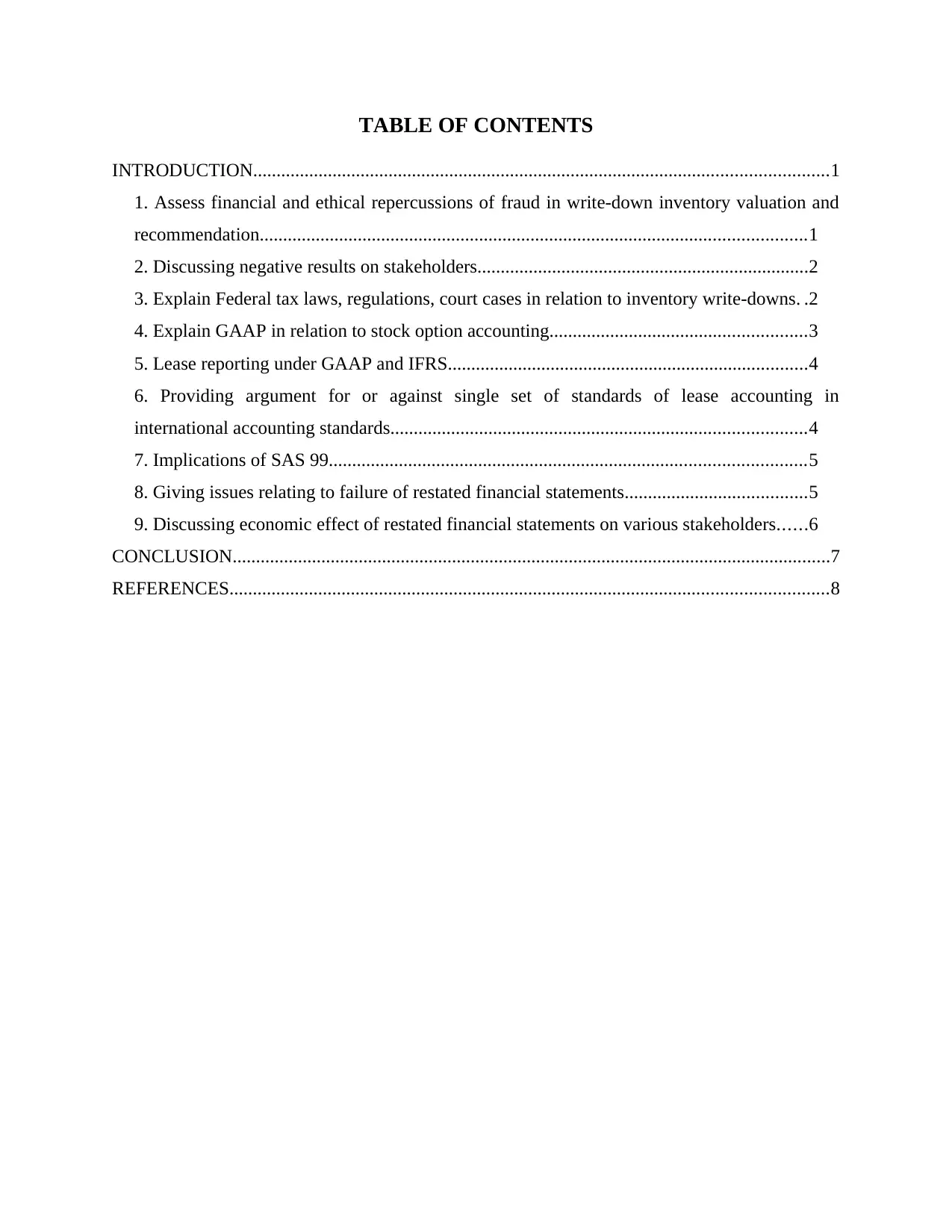
TABLE OF CONTENTS
INTRODUCTION...........................................................................................................................1
1. Assess financial and ethical repercussions of fraud in write-down inventory valuation and
recommendation.....................................................................................................................1
2. Discussing negative results on stakeholders.......................................................................2
3. Explain Federal tax laws, regulations, court cases in relation to inventory write-downs. .2
4. Explain GAAP in relation to stock option accounting.......................................................3
5. Lease reporting under GAAP and IFRS.............................................................................4
6. Providing argument for or against single set of standards of lease accounting in
international accounting standards.........................................................................................4
7. Implications of SAS 99......................................................................................................5
8. Giving issues relating to failure of restated financial statements.......................................5
9. Discussing economic effect of restated financial statements on various stakeholders......6
CONCLUSION................................................................................................................................7
REFERENCES................................................................................................................................8
INTRODUCTION...........................................................................................................................1
1. Assess financial and ethical repercussions of fraud in write-down inventory valuation and
recommendation.....................................................................................................................1
2. Discussing negative results on stakeholders.......................................................................2
3. Explain Federal tax laws, regulations, court cases in relation to inventory write-downs. .2
4. Explain GAAP in relation to stock option accounting.......................................................3
5. Lease reporting under GAAP and IFRS.............................................................................4
6. Providing argument for or against single set of standards of lease accounting in
international accounting standards.........................................................................................4
7. Implications of SAS 99......................................................................................................5
8. Giving issues relating to failure of restated financial statements.......................................5
9. Discussing economic effect of restated financial statements on various stakeholders......6
CONCLUSION................................................................................................................................7
REFERENCES................................................................................................................................8
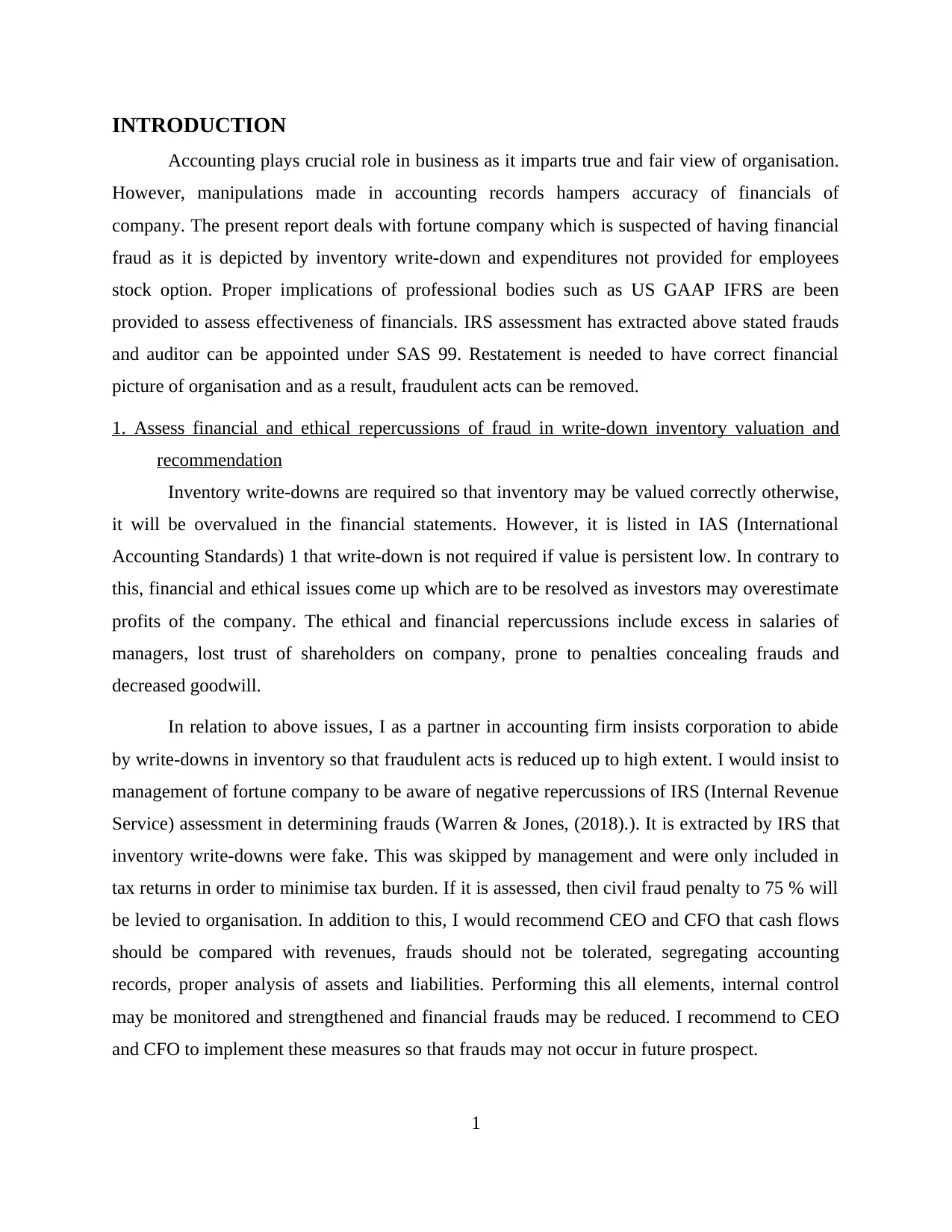
INTRODUCTION
Accounting plays crucial role in business as it imparts true and fair view of organisation.
However, manipulations made in accounting records hampers accuracy of financials of
company. The present report deals with fortune company which is suspected of having financial
fraud as it is depicted by inventory write-down and expenditures not provided for employees
stock option. Proper implications of professional bodies such as US GAAP IFRS are been
provided to assess effectiveness of financials. IRS assessment has extracted above stated frauds
and auditor can be appointed under SAS 99. Restatement is needed to have correct financial
picture of organisation and as a result, fraudulent acts can be removed.
1. Assess financial and ethical repercussions of fraud in write-down inventory valuation and
recommendation
Inventory write-downs are required so that inventory may be valued correctly otherwise,
it will be overvalued in the financial statements. However, it is listed in IAS (International
Accounting Standards) 1 that write-down is not required if value is persistent low. In contrary to
this, financial and ethical issues come up which are to be resolved as investors may overestimate
profits of the company. The ethical and financial repercussions include excess in salaries of
managers, lost trust of shareholders on company, prone to penalties concealing frauds and
decreased goodwill.
In relation to above issues, I as a partner in accounting firm insists corporation to abide
by write-downs in inventory so that fraudulent acts is reduced up to high extent. I would insist to
management of fortune company to be aware of negative repercussions of IRS (Internal Revenue
Service) assessment in determining frauds (Warren & Jones, (2018).). It is extracted by IRS that
inventory write-downs were fake. This was skipped by management and were only included in
tax returns in order to minimise tax burden. If it is assessed, then civil fraud penalty to 75 % will
be levied to organisation. In addition to this, I would recommend CEO and CFO that cash flows
should be compared with revenues, frauds should not be tolerated, segregating accounting
records, proper analysis of assets and liabilities. Performing this all elements, internal control
may be monitored and strengthened and financial frauds may be reduced. I recommend to CEO
and CFO to implement these measures so that frauds may not occur in future prospect.
1
Accounting plays crucial role in business as it imparts true and fair view of organisation.
However, manipulations made in accounting records hampers accuracy of financials of
company. The present report deals with fortune company which is suspected of having financial
fraud as it is depicted by inventory write-down and expenditures not provided for employees
stock option. Proper implications of professional bodies such as US GAAP IFRS are been
provided to assess effectiveness of financials. IRS assessment has extracted above stated frauds
and auditor can be appointed under SAS 99. Restatement is needed to have correct financial
picture of organisation and as a result, fraudulent acts can be removed.
1. Assess financial and ethical repercussions of fraud in write-down inventory valuation and
recommendation
Inventory write-downs are required so that inventory may be valued correctly otherwise,
it will be overvalued in the financial statements. However, it is listed in IAS (International
Accounting Standards) 1 that write-down is not required if value is persistent low. In contrary to
this, financial and ethical issues come up which are to be resolved as investors may overestimate
profits of the company. The ethical and financial repercussions include excess in salaries of
managers, lost trust of shareholders on company, prone to penalties concealing frauds and
decreased goodwill.
In relation to above issues, I as a partner in accounting firm insists corporation to abide
by write-downs in inventory so that fraudulent acts is reduced up to high extent. I would insist to
management of fortune company to be aware of negative repercussions of IRS (Internal Revenue
Service) assessment in determining frauds (Warren & Jones, (2018).). It is extracted by IRS that
inventory write-downs were fake. This was skipped by management and were only included in
tax returns in order to minimise tax burden. If it is assessed, then civil fraud penalty to 75 % will
be levied to organisation. In addition to this, I would recommend CEO and CFO that cash flows
should be compared with revenues, frauds should not be tolerated, segregating accounting
records, proper analysis of assets and liabilities. Performing this all elements, internal control
may be monitored and strengthened and financial frauds may be reduced. I recommend to CEO
and CFO to implement these measures so that frauds may not occur in future prospect.
1
⊘ This is a preview!⊘
Do you want full access?
Subscribe today to unlock all pages.

Trusted by 1+ million students worldwide
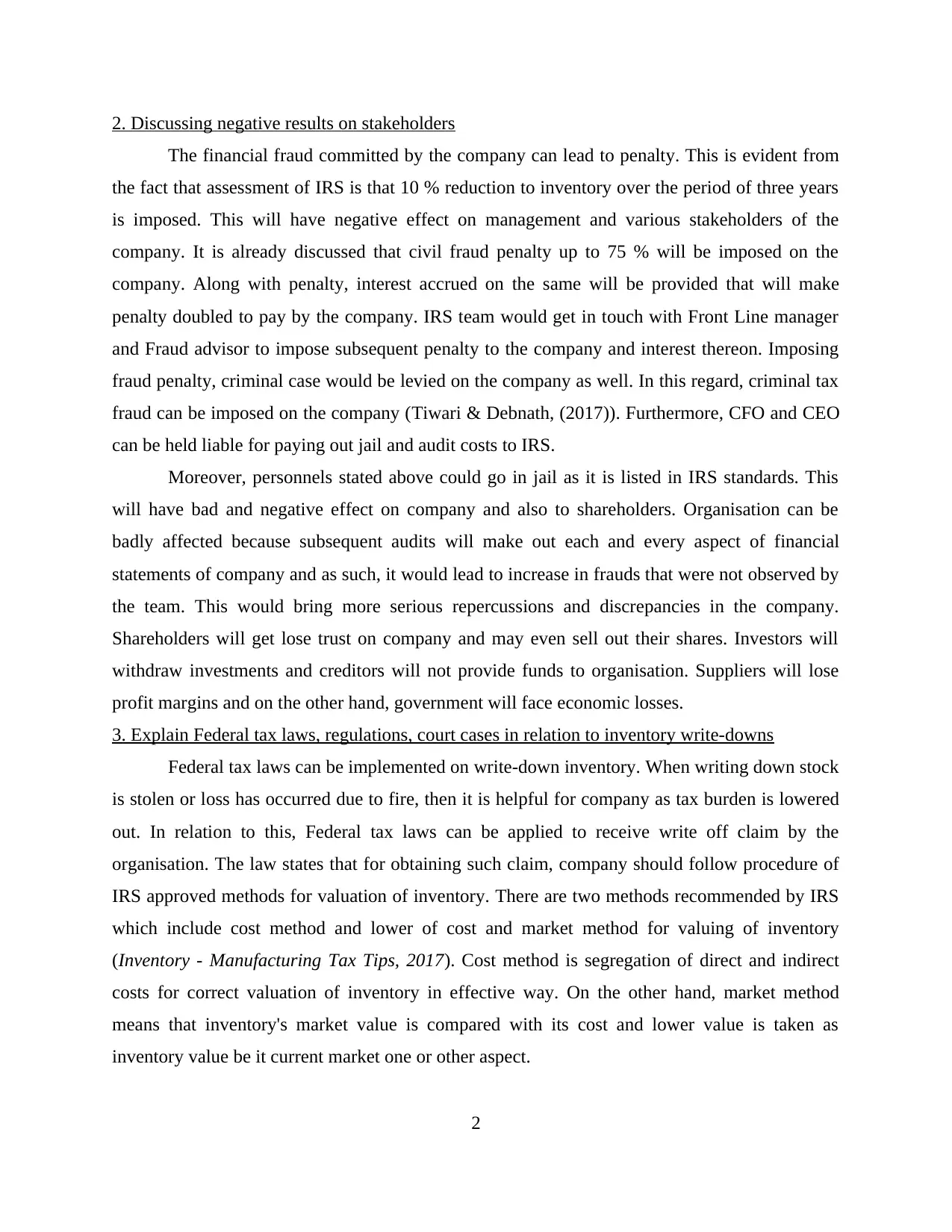
2. Discussing negative results on stakeholders
The financial fraud committed by the company can lead to penalty. This is evident from
the fact that assessment of IRS is that 10 % reduction to inventory over the period of three years
is imposed. This will have negative effect on management and various stakeholders of the
company. It is already discussed that civil fraud penalty up to 75 % will be imposed on the
company. Along with penalty, interest accrued on the same will be provided that will make
penalty doubled to pay by the company. IRS team would get in touch with Front Line manager
and Fraud advisor to impose subsequent penalty to the company and interest thereon. Imposing
fraud penalty, criminal case would be levied on the company as well. In this regard, criminal tax
fraud can be imposed on the company (Tiwari & Debnath, (2017)). Furthermore, CFO and CEO
can be held liable for paying out jail and audit costs to IRS.
Moreover, personnels stated above could go in jail as it is listed in IRS standards. This
will have bad and negative effect on company and also to shareholders. Organisation can be
badly affected because subsequent audits will make out each and every aspect of financial
statements of company and as such, it would lead to increase in frauds that were not observed by
the team. This would bring more serious repercussions and discrepancies in the company.
Shareholders will get lose trust on company and may even sell out their shares. Investors will
withdraw investments and creditors will not provide funds to organisation. Suppliers will lose
profit margins and on the other hand, government will face economic losses.
3. Explain Federal tax laws, regulations, court cases in relation to inventory write-downs
Federal tax laws can be implemented on write-down inventory. When writing down stock
is stolen or loss has occurred due to fire, then it is helpful for company as tax burden is lowered
out. In relation to this, Federal tax laws can be applied to receive write off claim by the
organisation. The law states that for obtaining such claim, company should follow procedure of
IRS approved methods for valuation of inventory. There are two methods recommended by IRS
which include cost method and lower of cost and market method for valuing of inventory
(Inventory - Manufacturing Tax Tips, 2017). Cost method is segregation of direct and indirect
costs for correct valuation of inventory in effective way. On the other hand, market method
means that inventory's market value is compared with its cost and lower value is taken as
inventory value be it current market one or other aspect.
2
The financial fraud committed by the company can lead to penalty. This is evident from
the fact that assessment of IRS is that 10 % reduction to inventory over the period of three years
is imposed. This will have negative effect on management and various stakeholders of the
company. It is already discussed that civil fraud penalty up to 75 % will be imposed on the
company. Along with penalty, interest accrued on the same will be provided that will make
penalty doubled to pay by the company. IRS team would get in touch with Front Line manager
and Fraud advisor to impose subsequent penalty to the company and interest thereon. Imposing
fraud penalty, criminal case would be levied on the company as well. In this regard, criminal tax
fraud can be imposed on the company (Tiwari & Debnath, (2017)). Furthermore, CFO and CEO
can be held liable for paying out jail and audit costs to IRS.
Moreover, personnels stated above could go in jail as it is listed in IRS standards. This
will have bad and negative effect on company and also to shareholders. Organisation can be
badly affected because subsequent audits will make out each and every aspect of financial
statements of company and as such, it would lead to increase in frauds that were not observed by
the team. This would bring more serious repercussions and discrepancies in the company.
Shareholders will get lose trust on company and may even sell out their shares. Investors will
withdraw investments and creditors will not provide funds to organisation. Suppliers will lose
profit margins and on the other hand, government will face economic losses.
3. Explain Federal tax laws, regulations, court cases in relation to inventory write-downs
Federal tax laws can be implemented on write-down inventory. When writing down stock
is stolen or loss has occurred due to fire, then it is helpful for company as tax burden is lowered
out. In relation to this, Federal tax laws can be applied to receive write off claim by the
organisation. The law states that for obtaining such claim, company should follow procedure of
IRS approved methods for valuation of inventory. There are two methods recommended by IRS
which include cost method and lower of cost and market method for valuing of inventory
(Inventory - Manufacturing Tax Tips, 2017). Cost method is segregation of direct and indirect
costs for correct valuation of inventory in effective way. On the other hand, market method
means that inventory's market value is compared with its cost and lower value is taken as
inventory value be it current market one or other aspect.
2
Paraphrase This Document
Need a fresh take? Get an instant paraphrase of this document with our AI Paraphraser
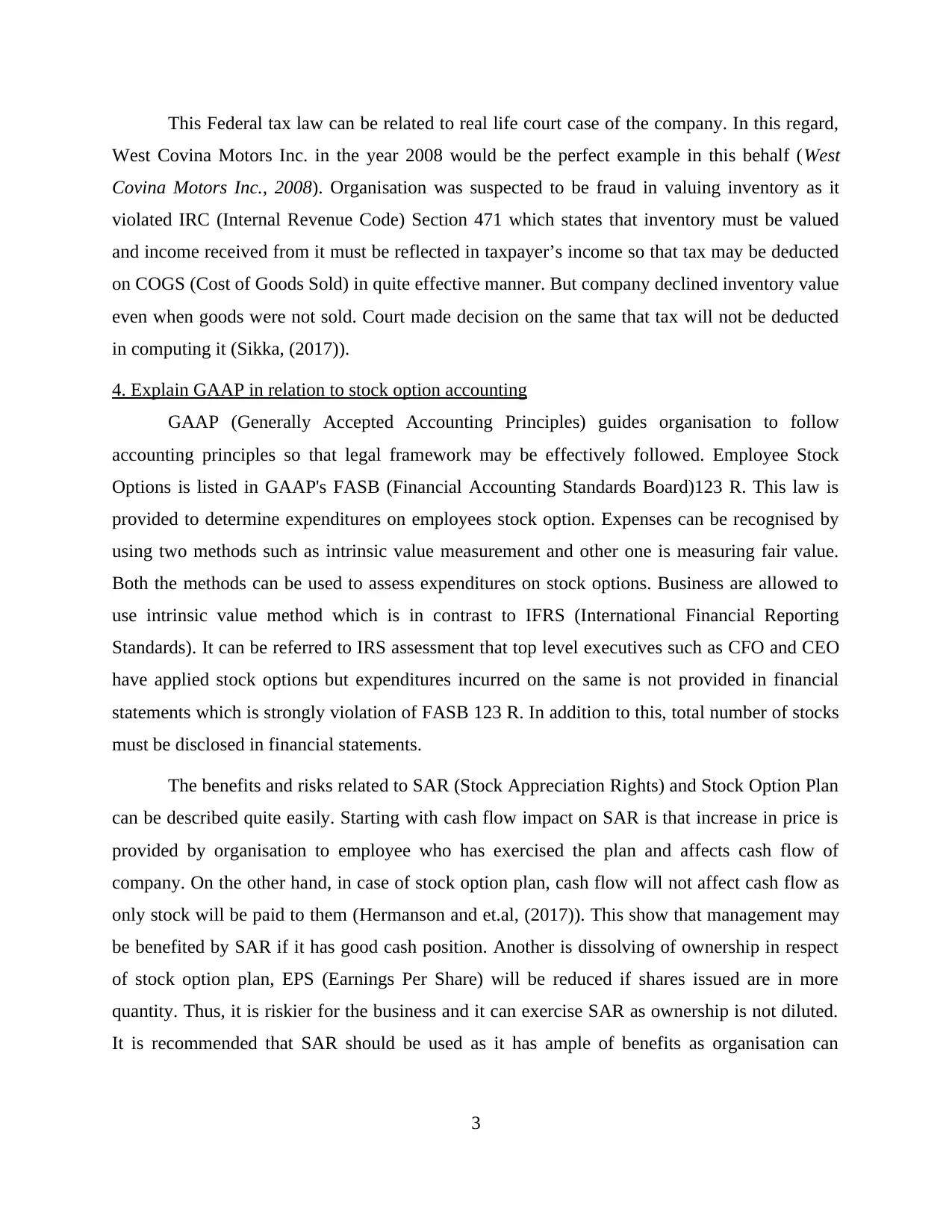
This Federal tax law can be related to real life court case of the company. In this regard,
West Covina Motors Inc. in the year 2008 would be the perfect example in this behalf (West
Covina Motors Inc., 2008). Organisation was suspected to be fraud in valuing inventory as it
violated IRC (Internal Revenue Code) Section 471 which states that inventory must be valued
and income received from it must be reflected in taxpayer’s income so that tax may be deducted
on COGS (Cost of Goods Sold) in quite effective manner. But company declined inventory value
even when goods were not sold. Court made decision on the same that tax will not be deducted
in computing it (Sikka, (2017)).
4. Explain GAAP in relation to stock option accounting
GAAP (Generally Accepted Accounting Principles) guides organisation to follow
accounting principles so that legal framework may be effectively followed. Employee Stock
Options is listed in GAAP's FASB (Financial Accounting Standards Board)123 R. This law is
provided to determine expenditures on employees stock option. Expenses can be recognised by
using two methods such as intrinsic value measurement and other one is measuring fair value.
Both the methods can be used to assess expenditures on stock options. Business are allowed to
use intrinsic value method which is in contrast to IFRS (International Financial Reporting
Standards). It can be referred to IRS assessment that top level executives such as CFO and CEO
have applied stock options but expenditures incurred on the same is not provided in financial
statements which is strongly violation of FASB 123 R. In addition to this, total number of stocks
must be disclosed in financial statements.
The benefits and risks related to SAR (Stock Appreciation Rights) and Stock Option Plan
can be described quite easily. Starting with cash flow impact on SAR is that increase in price is
provided by organisation to employee who has exercised the plan and affects cash flow of
company. On the other hand, in case of stock option plan, cash flow will not affect cash flow as
only stock will be paid to them (Hermanson and et.al, (2017)). This show that management may
be benefited by SAR if it has good cash position. Another is dissolving of ownership in respect
of stock option plan, EPS (Earnings Per Share) will be reduced if shares issued are in more
quantity. Thus, it is riskier for the business and it can exercise SAR as ownership is not diluted.
It is recommended that SAR should be used as it has ample of benefits as organisation can
3
West Covina Motors Inc. in the year 2008 would be the perfect example in this behalf (West
Covina Motors Inc., 2008). Organisation was suspected to be fraud in valuing inventory as it
violated IRC (Internal Revenue Code) Section 471 which states that inventory must be valued
and income received from it must be reflected in taxpayer’s income so that tax may be deducted
on COGS (Cost of Goods Sold) in quite effective manner. But company declined inventory value
even when goods were not sold. Court made decision on the same that tax will not be deducted
in computing it (Sikka, (2017)).
4. Explain GAAP in relation to stock option accounting
GAAP (Generally Accepted Accounting Principles) guides organisation to follow
accounting principles so that legal framework may be effectively followed. Employee Stock
Options is listed in GAAP's FASB (Financial Accounting Standards Board)123 R. This law is
provided to determine expenditures on employees stock option. Expenses can be recognised by
using two methods such as intrinsic value measurement and other one is measuring fair value.
Both the methods can be used to assess expenditures on stock options. Business are allowed to
use intrinsic value method which is in contrast to IFRS (International Financial Reporting
Standards). It can be referred to IRS assessment that top level executives such as CFO and CEO
have applied stock options but expenditures incurred on the same is not provided in financial
statements which is strongly violation of FASB 123 R. In addition to this, total number of stocks
must be disclosed in financial statements.
The benefits and risks related to SAR (Stock Appreciation Rights) and Stock Option Plan
can be described quite easily. Starting with cash flow impact on SAR is that increase in price is
provided by organisation to employee who has exercised the plan and affects cash flow of
company. On the other hand, in case of stock option plan, cash flow will not affect cash flow as
only stock will be paid to them (Hermanson and et.al, (2017)). This show that management may
be benefited by SAR if it has good cash position. Another is dissolving of ownership in respect
of stock option plan, EPS (Earnings Per Share) will be reduced if shares issued are in more
quantity. Thus, it is riskier for the business and it can exercise SAR as ownership is not diluted.
It is recommended that SAR should be used as it has ample of benefits as organisation can
3
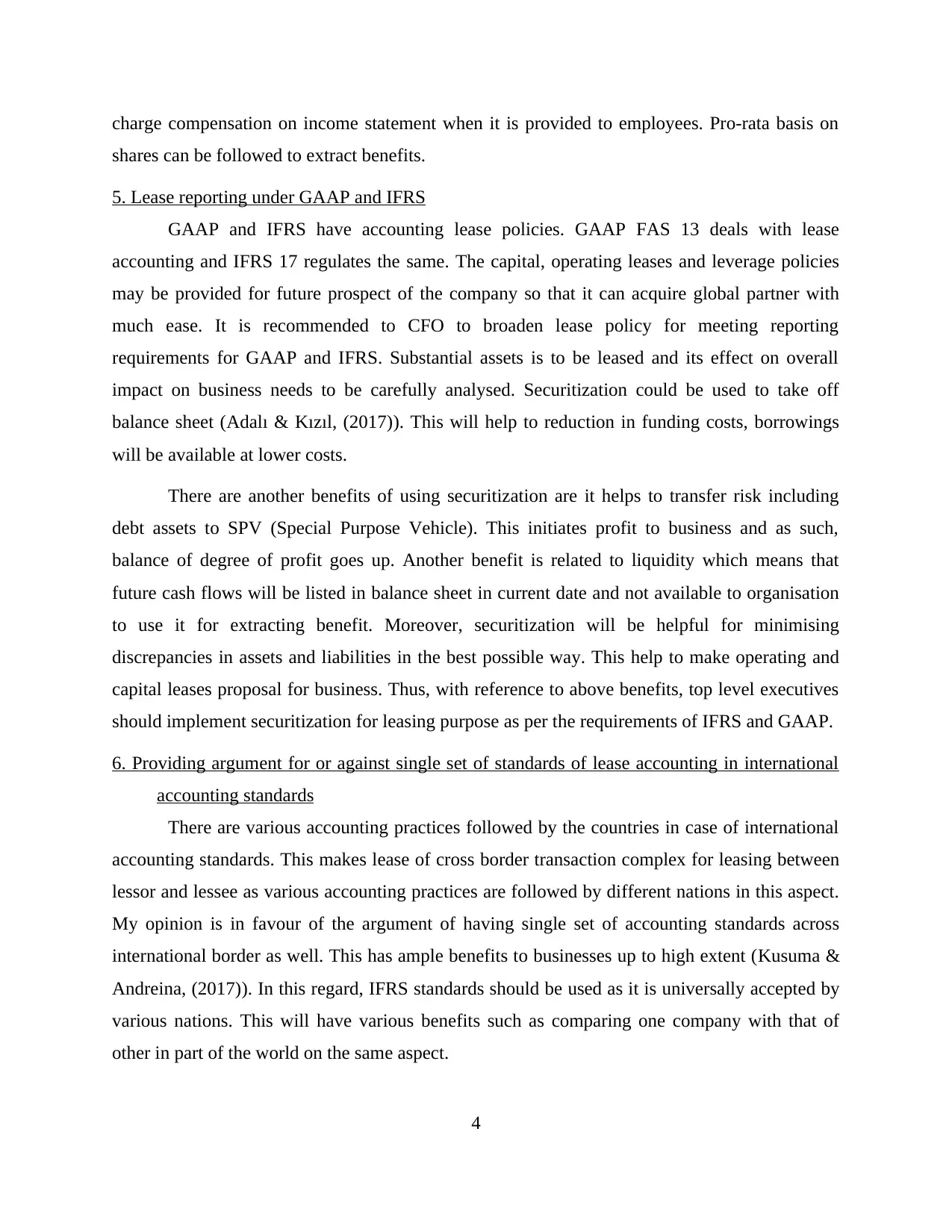
charge compensation on income statement when it is provided to employees. Pro-rata basis on
shares can be followed to extract benefits.
5. Lease reporting under GAAP and IFRS
GAAP and IFRS have accounting lease policies. GAAP FAS 13 deals with lease
accounting and IFRS 17 regulates the same. The capital, operating leases and leverage policies
may be provided for future prospect of the company so that it can acquire global partner with
much ease. It is recommended to CFO to broaden lease policy for meeting reporting
requirements for GAAP and IFRS. Substantial assets is to be leased and its effect on overall
impact on business needs to be carefully analysed. Securitization could be used to take off
balance sheet (Adalı & Kızıl, (2017)). This will help to reduction in funding costs, borrowings
will be available at lower costs.
There are another benefits of using securitization are it helps to transfer risk including
debt assets to SPV (Special Purpose Vehicle). This initiates profit to business and as such,
balance of degree of profit goes up. Another benefit is related to liquidity which means that
future cash flows will be listed in balance sheet in current date and not available to organisation
to use it for extracting benefit. Moreover, securitization will be helpful for minimising
discrepancies in assets and liabilities in the best possible way. This help to make operating and
capital leases proposal for business. Thus, with reference to above benefits, top level executives
should implement securitization for leasing purpose as per the requirements of IFRS and GAAP.
6. Providing argument for or against single set of standards of lease accounting in international
accounting standards
There are various accounting practices followed by the countries in case of international
accounting standards. This makes lease of cross border transaction complex for leasing between
lessor and lessee as various accounting practices are followed by different nations in this aspect.
My opinion is in favour of the argument of having single set of accounting standards across
international border as well. This has ample benefits to businesses up to high extent (Kusuma &
Andreina, (2017)). In this regard, IFRS standards should be used as it is universally accepted by
various nations. This will have various benefits such as comparing one company with that of
other in part of the world on the same aspect.
4
shares can be followed to extract benefits.
5. Lease reporting under GAAP and IFRS
GAAP and IFRS have accounting lease policies. GAAP FAS 13 deals with lease
accounting and IFRS 17 regulates the same. The capital, operating leases and leverage policies
may be provided for future prospect of the company so that it can acquire global partner with
much ease. It is recommended to CFO to broaden lease policy for meeting reporting
requirements for GAAP and IFRS. Substantial assets is to be leased and its effect on overall
impact on business needs to be carefully analysed. Securitization could be used to take off
balance sheet (Adalı & Kızıl, (2017)). This will help to reduction in funding costs, borrowings
will be available at lower costs.
There are another benefits of using securitization are it helps to transfer risk including
debt assets to SPV (Special Purpose Vehicle). This initiates profit to business and as such,
balance of degree of profit goes up. Another benefit is related to liquidity which means that
future cash flows will be listed in balance sheet in current date and not available to organisation
to use it for extracting benefit. Moreover, securitization will be helpful for minimising
discrepancies in assets and liabilities in the best possible way. This help to make operating and
capital leases proposal for business. Thus, with reference to above benefits, top level executives
should implement securitization for leasing purpose as per the requirements of IFRS and GAAP.
6. Providing argument for or against single set of standards of lease accounting in international
accounting standards
There are various accounting practices followed by the countries in case of international
accounting standards. This makes lease of cross border transaction complex for leasing between
lessor and lessee as various accounting practices are followed by different nations in this aspect.
My opinion is in favour of the argument of having single set of accounting standards across
international border as well. This has ample benefits to businesses up to high extent (Kusuma &
Andreina, (2017)). In this regard, IFRS standards should be used as it is universally accepted by
various nations. This will have various benefits such as comparing one company with that of
other in part of the world on the same aspect.
4
⊘ This is a preview!⊘
Do you want full access?
Subscribe today to unlock all pages.

Trusted by 1+ million students worldwide
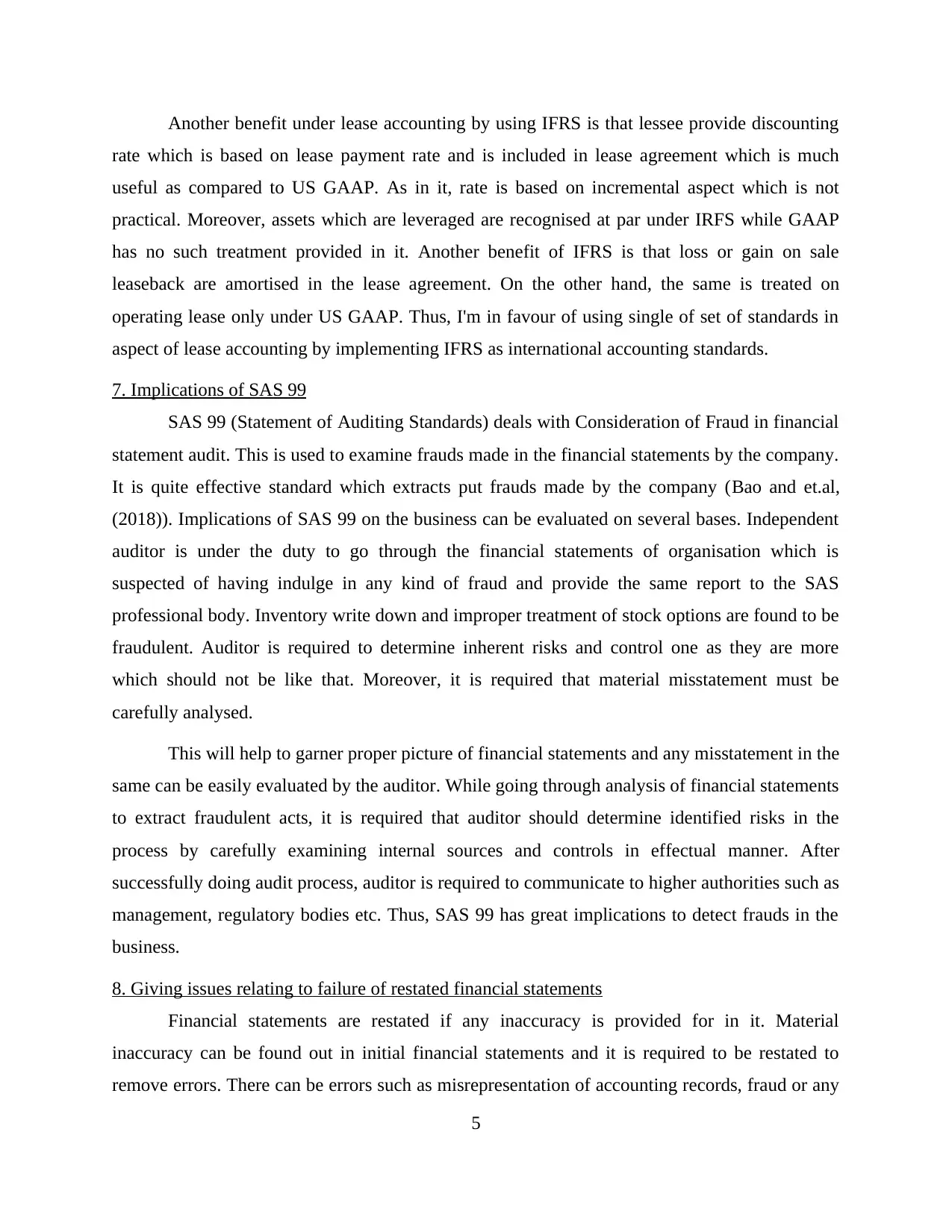
Another benefit under lease accounting by using IFRS is that lessee provide discounting
rate which is based on lease payment rate and is included in lease agreement which is much
useful as compared to US GAAP. As in it, rate is based on incremental aspect which is not
practical. Moreover, assets which are leveraged are recognised at par under IRFS while GAAP
has no such treatment provided in it. Another benefit of IFRS is that loss or gain on sale
leaseback are amortised in the lease agreement. On the other hand, the same is treated on
operating lease only under US GAAP. Thus, I'm in favour of using single of set of standards in
aspect of lease accounting by implementing IFRS as international accounting standards.
7. Implications of SAS 99
SAS 99 (Statement of Auditing Standards) deals with Consideration of Fraud in financial
statement audit. This is used to examine frauds made in the financial statements by the company.
It is quite effective standard which extracts put frauds made by the company (Bao and et.al,
(2018)). Implications of SAS 99 on the business can be evaluated on several bases. Independent
auditor is under the duty to go through the financial statements of organisation which is
suspected of having indulge in any kind of fraud and provide the same report to the SAS
professional body. Inventory write down and improper treatment of stock options are found to be
fraudulent. Auditor is required to determine inherent risks and control one as they are more
which should not be like that. Moreover, it is required that material misstatement must be
carefully analysed.
This will help to garner proper picture of financial statements and any misstatement in the
same can be easily evaluated by the auditor. While going through analysis of financial statements
to extract fraudulent acts, it is required that auditor should determine identified risks in the
process by carefully examining internal sources and controls in effectual manner. After
successfully doing audit process, auditor is required to communicate to higher authorities such as
management, regulatory bodies etc. Thus, SAS 99 has great implications to detect frauds in the
business.
8. Giving issues relating to failure of restated financial statements
Financial statements are restated if any inaccuracy is provided for in it. Material
inaccuracy can be found out in initial financial statements and it is required to be restated to
remove errors. There can be errors such as misrepresentation of accounting records, fraud or any
5
rate which is based on lease payment rate and is included in lease agreement which is much
useful as compared to US GAAP. As in it, rate is based on incremental aspect which is not
practical. Moreover, assets which are leveraged are recognised at par under IRFS while GAAP
has no such treatment provided in it. Another benefit of IFRS is that loss or gain on sale
leaseback are amortised in the lease agreement. On the other hand, the same is treated on
operating lease only under US GAAP. Thus, I'm in favour of using single of set of standards in
aspect of lease accounting by implementing IFRS as international accounting standards.
7. Implications of SAS 99
SAS 99 (Statement of Auditing Standards) deals with Consideration of Fraud in financial
statement audit. This is used to examine frauds made in the financial statements by the company.
It is quite effective standard which extracts put frauds made by the company (Bao and et.al,
(2018)). Implications of SAS 99 on the business can be evaluated on several bases. Independent
auditor is under the duty to go through the financial statements of organisation which is
suspected of having indulge in any kind of fraud and provide the same report to the SAS
professional body. Inventory write down and improper treatment of stock options are found to be
fraudulent. Auditor is required to determine inherent risks and control one as they are more
which should not be like that. Moreover, it is required that material misstatement must be
carefully analysed.
This will help to garner proper picture of financial statements and any misstatement in the
same can be easily evaluated by the auditor. While going through analysis of financial statements
to extract fraudulent acts, it is required that auditor should determine identified risks in the
process by carefully examining internal sources and controls in effectual manner. After
successfully doing audit process, auditor is required to communicate to higher authorities such as
management, regulatory bodies etc. Thus, SAS 99 has great implications to detect frauds in the
business.
8. Giving issues relating to failure of restated financial statements
Financial statements are restated if any inaccuracy is provided for in it. Material
inaccuracy can be found out in initial financial statements and it is required to be restated to
remove errors. There can be errors such as misrepresentation of accounting records, fraud or any
5
Paraphrase This Document
Need a fresh take? Get an instant paraphrase of this document with our AI Paraphraser
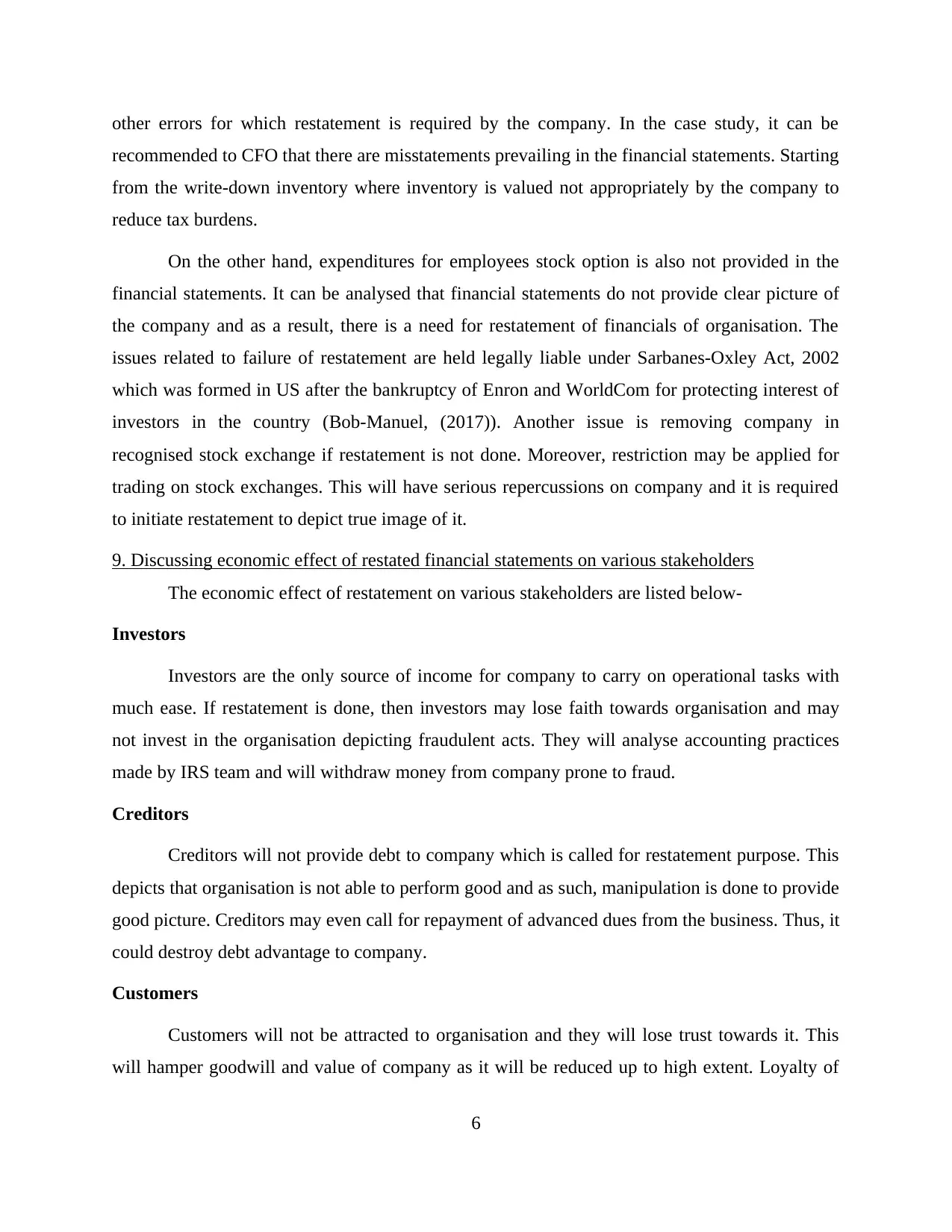
other errors for which restatement is required by the company. In the case study, it can be
recommended to CFO that there are misstatements prevailing in the financial statements. Starting
from the write-down inventory where inventory is valued not appropriately by the company to
reduce tax burdens.
On the other hand, expenditures for employees stock option is also not provided in the
financial statements. It can be analysed that financial statements do not provide clear picture of
the company and as a result, there is a need for restatement of financials of organisation. The
issues related to failure of restatement are held legally liable under Sarbanes-Oxley Act, 2002
which was formed in US after the bankruptcy of Enron and WorldCom for protecting interest of
investors in the country (Bob-Manuel, (2017)). Another issue is removing company in
recognised stock exchange if restatement is not done. Moreover, restriction may be applied for
trading on stock exchanges. This will have serious repercussions on company and it is required
to initiate restatement to depict true image of it.
9. Discussing economic effect of restated financial statements on various stakeholders
The economic effect of restatement on various stakeholders are listed below-
Investors
Investors are the only source of income for company to carry on operational tasks with
much ease. If restatement is done, then investors may lose faith towards organisation and may
not invest in the organisation depicting fraudulent acts. They will analyse accounting practices
made by IRS team and will withdraw money from company prone to fraud.
Creditors
Creditors will not provide debt to company which is called for restatement purpose. This
depicts that organisation is not able to perform good and as such, manipulation is done to provide
good picture. Creditors may even call for repayment of advanced dues from the business. Thus, it
could destroy debt advantage to company.
Customers
Customers will not be attracted to organisation and they will lose trust towards it. This
will hamper goodwill and value of company as it will be reduced up to high extent. Loyalty of
6
recommended to CFO that there are misstatements prevailing in the financial statements. Starting
from the write-down inventory where inventory is valued not appropriately by the company to
reduce tax burdens.
On the other hand, expenditures for employees stock option is also not provided in the
financial statements. It can be analysed that financial statements do not provide clear picture of
the company and as a result, there is a need for restatement of financials of organisation. The
issues related to failure of restatement are held legally liable under Sarbanes-Oxley Act, 2002
which was formed in US after the bankruptcy of Enron and WorldCom for protecting interest of
investors in the country (Bob-Manuel, (2017)). Another issue is removing company in
recognised stock exchange if restatement is not done. Moreover, restriction may be applied for
trading on stock exchanges. This will have serious repercussions on company and it is required
to initiate restatement to depict true image of it.
9. Discussing economic effect of restated financial statements on various stakeholders
The economic effect of restatement on various stakeholders are listed below-
Investors
Investors are the only source of income for company to carry on operational tasks with
much ease. If restatement is done, then investors may lose faith towards organisation and may
not invest in the organisation depicting fraudulent acts. They will analyse accounting practices
made by IRS team and will withdraw money from company prone to fraud.
Creditors
Creditors will not provide debt to company which is called for restatement purpose. This
depicts that organisation is not able to perform good and as such, manipulation is done to provide
good picture. Creditors may even call for repayment of advanced dues from the business. Thus, it
could destroy debt advantage to company.
Customers
Customers will not be attracted to organisation and they will lose trust towards it. This
will hamper goodwill and value of company as it will be reduced up to high extent. Loyalty of
6
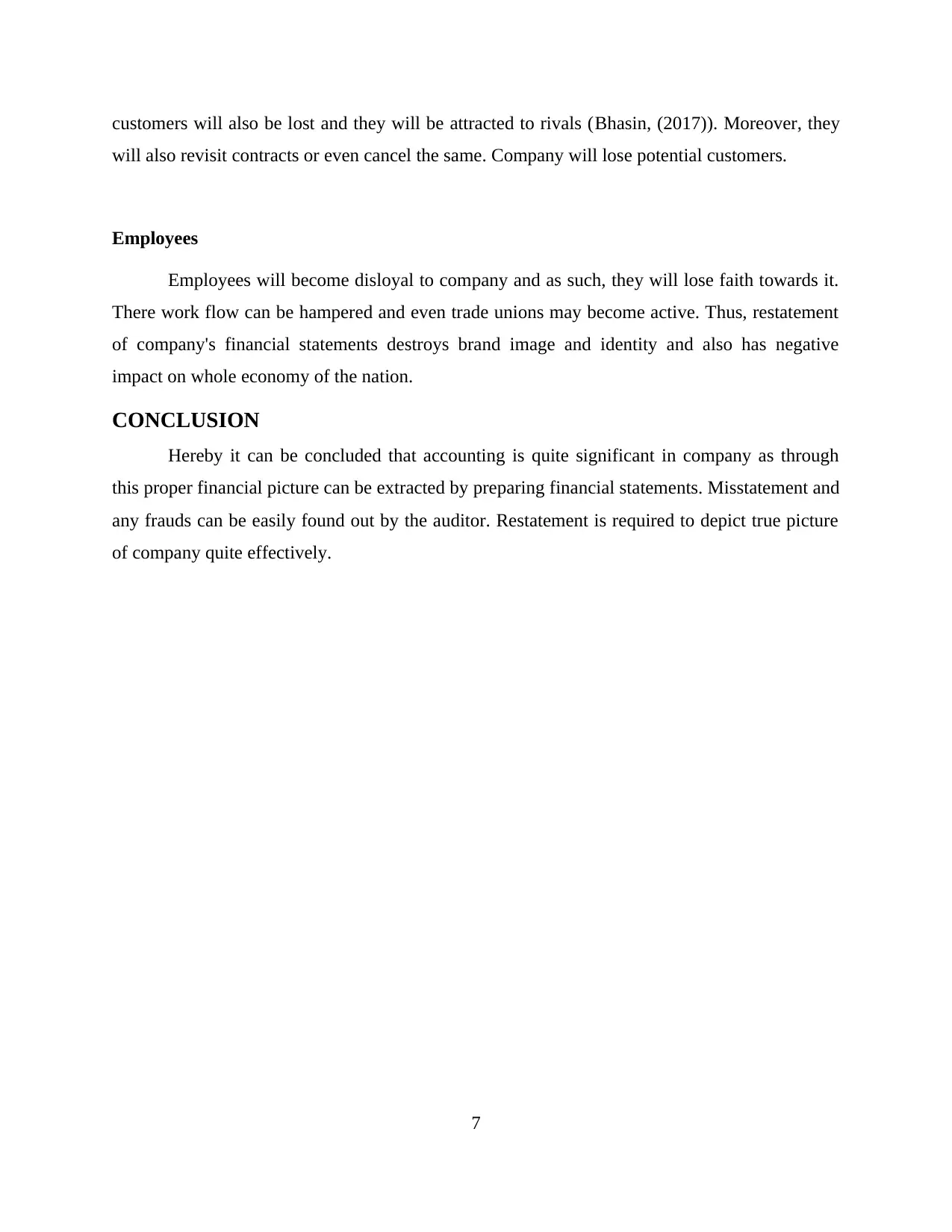
customers will also be lost and they will be attracted to rivals (Bhasin, (2017)). Moreover, they
will also revisit contracts or even cancel the same. Company will lose potential customers.
Employees
Employees will become disloyal to company and as such, they will lose faith towards it.
There work flow can be hampered and even trade unions may become active. Thus, restatement
of company's financial statements destroys brand image and identity and also has negative
impact on whole economy of the nation.
CONCLUSION
Hereby it can be concluded that accounting is quite significant in company as through
this proper financial picture can be extracted by preparing financial statements. Misstatement and
any frauds can be easily found out by the auditor. Restatement is required to depict true picture
of company quite effectively.
7
will also revisit contracts or even cancel the same. Company will lose potential customers.
Employees
Employees will become disloyal to company and as such, they will lose faith towards it.
There work flow can be hampered and even trade unions may become active. Thus, restatement
of company's financial statements destroys brand image and identity and also has negative
impact on whole economy of the nation.
CONCLUSION
Hereby it can be concluded that accounting is quite significant in company as through
this proper financial picture can be extracted by preparing financial statements. Misstatement and
any frauds can be easily found out by the auditor. Restatement is required to depict true picture
of company quite effectively.
7
⊘ This is a preview!⊘
Do you want full access?
Subscribe today to unlock all pages.

Trusted by 1+ million students worldwide
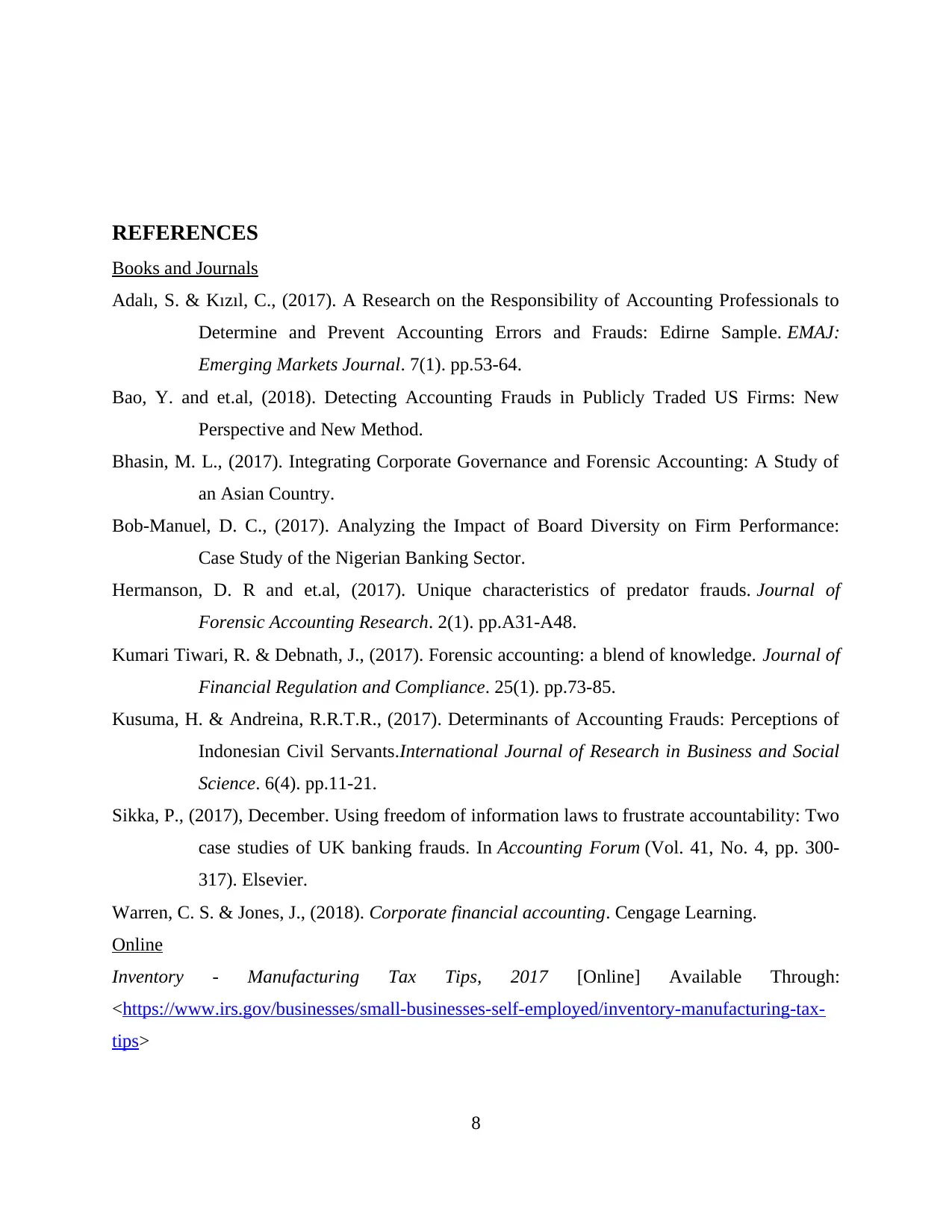
REFERENCES
Books and Journals
Adalı, S. & Kızıl, C., (2017). A Research on the Responsibility of Accounting Professionals to
Determine and Prevent Accounting Errors and Frauds: Edirne Sample. EMAJ:
Emerging Markets Journal. 7(1). pp.53-64.
Bao, Y. and et.al, (2018). Detecting Accounting Frauds in Publicly Traded US Firms: New
Perspective and New Method.
Bhasin, M. L., (2017). Integrating Corporate Governance and Forensic Accounting: A Study of
an Asian Country.
Bob-Manuel, D. C., (2017). Analyzing the Impact of Board Diversity on Firm Performance:
Case Study of the Nigerian Banking Sector.
Hermanson, D. R and et.al, (2017). Unique characteristics of predator frauds. Journal of
Forensic Accounting Research. 2(1). pp.A31-A48.
Kumari Tiwari, R. & Debnath, J., (2017). Forensic accounting: a blend of knowledge. Journal of
Financial Regulation and Compliance. 25(1). pp.73-85.
Kusuma, H. & Andreina, R.R.T.R., (2017). Determinants of Accounting Frauds: Perceptions of
Indonesian Civil Servants.International Journal of Research in Business and Social
Science. 6(4). pp.11-21.
Sikka, P., (2017), December. Using freedom of information laws to frustrate accountability: Two
case studies of UK banking frauds. In Accounting Forum (Vol. 41, No. 4, pp. 300-
317). Elsevier.
Warren, C. S. & Jones, J., (2018). Corporate financial accounting. Cengage Learning.
Online
Inventory - Manufacturing Tax Tips, 2017 [Online] Available Through:
<https://www.irs.gov/businesses/small-businesses-self-employed/inventory-manufacturing-tax-
tips>
8
Books and Journals
Adalı, S. & Kızıl, C., (2017). A Research on the Responsibility of Accounting Professionals to
Determine and Prevent Accounting Errors and Frauds: Edirne Sample. EMAJ:
Emerging Markets Journal. 7(1). pp.53-64.
Bao, Y. and et.al, (2018). Detecting Accounting Frauds in Publicly Traded US Firms: New
Perspective and New Method.
Bhasin, M. L., (2017). Integrating Corporate Governance and Forensic Accounting: A Study of
an Asian Country.
Bob-Manuel, D. C., (2017). Analyzing the Impact of Board Diversity on Firm Performance:
Case Study of the Nigerian Banking Sector.
Hermanson, D. R and et.al, (2017). Unique characteristics of predator frauds. Journal of
Forensic Accounting Research. 2(1). pp.A31-A48.
Kumari Tiwari, R. & Debnath, J., (2017). Forensic accounting: a blend of knowledge. Journal of
Financial Regulation and Compliance. 25(1). pp.73-85.
Kusuma, H. & Andreina, R.R.T.R., (2017). Determinants of Accounting Frauds: Perceptions of
Indonesian Civil Servants.International Journal of Research in Business and Social
Science. 6(4). pp.11-21.
Sikka, P., (2017), December. Using freedom of information laws to frustrate accountability: Two
case studies of UK banking frauds. In Accounting Forum (Vol. 41, No. 4, pp. 300-
317). Elsevier.
Warren, C. S. & Jones, J., (2018). Corporate financial accounting. Cengage Learning.
Online
Inventory - Manufacturing Tax Tips, 2017 [Online] Available Through:
<https://www.irs.gov/businesses/small-businesses-self-employed/inventory-manufacturing-tax-
tips>
8
Paraphrase This Document
Need a fresh take? Get an instant paraphrase of this document with our AI Paraphraser

West Covina Motors Inc., 2008 [PDF] Available Through:
<https://www.ustaxcourt.gov/InOpHistoric/westcovina.TCM.WPD.pdf>
9
<https://www.ustaxcourt.gov/InOpHistoric/westcovina.TCM.WPD.pdf>
9
1 out of 11
Your All-in-One AI-Powered Toolkit for Academic Success.
+13062052269
info@desklib.com
Available 24*7 on WhatsApp / Email
![[object Object]](/_next/static/media/star-bottom.7253800d.svg)
Unlock your academic potential
Copyright © 2020–2026 A2Z Services. All Rights Reserved. Developed and managed by ZUCOL.
